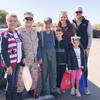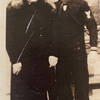

Leo Osterhout has served America in two wars, and then began a successful business that spanned over six decades. Leo’s most important legacy, however, is his family that follows him.
Leo joined the Navy in January 1942, soon after the Japanese attacked Pearl Harbor. Pearl Harbor had a big impact on him, and because of it, Leo decided to enlist in the Navy so that he could choose his branch of service and hopefully avoid the draft.
At almost 99 years of age, Leo was the oldest Blanco veteran in the Blanco 2019 Veterans Day Parade. Leo says of America, “It’s the only place for me. There’s no place like America, and everything that you want and need is here.”
Early life
Leo was born in Independence, Kansas, in 1921. “We moved to Independence and lived with my grandparents during the Great Depression because Dad was laid off. I joined the Navy after I finished high school. Three or four of my buddies and I, including Bob Potter, went to Joplin, Missouri to enlist. Bob and I were the only ones to pass the physical.”
World War II
Boot camp for Leo was at the Great Lakes, near Chicago.
“They were trying to get the enlisted ranks built up because the Navy was depleted, and they
needed men to man and fix the ships,” said Leo’s son, Danny Osterhout. After boot camp, Leo shipped out to Panama at the Naval Radio Station where he served as a ship tender who rebuilt ships.
“They took me off the ship and put me on a submarine base as we were going through the canal, and then to the Radio Station where the large diesels were, and where I spent most of my time,” Leo said. “All Naval information went through Panama and from there to the South Pacific and everywhere else. We had 700-800 foot towers that handled everything for the Pacific, and after diesel school I became a diesel mechanic.”
“I worked on a fleet tug for one year, and from there went out and worked on the ships. A 750 HP generator took care of the large and small ships, and we’d start it up every few weeks for 15 minutes to an hour to make sure it was ready to go. We never used it for an emergency but it was there if needed.”
Leo was known as “an engineman,” and during the time he was in Panama he worked on the diesel generators wherever the Navy needed him. All repairs were done on board.
“We had a lot of scuba divers on our ships, and we trained them to work on the ships below
the water, at about 100 feet,” said Leo. The divers completed deep sea training, and were
trained in the water, and most were welders. The BCN asked, “Did the ships to be repaired
come to you?” Leo answered, “Some did, and some had divers go back and forth, because
they couldn’t all get to us.”
“In Panama, I was pretty much on base in the canal. There was a Marine Corps detachment
to guard the base, and they stayed in the same barracks we did,” Leo said.
He was unable to go home during the two years he was on active duty in Panama.
“I was classed as overseas, so we stayed in the Pacific. I did go home between World War II and Korea, after I was discharged from the Pacific.”
Korean Conflict
According to Danny, “Dad is one of only a few with two discharge papers, one for World War II and one from the Korean Conflict. He was still in the Naval Reserves after World War II, and in 1948-1951 was sent to San Diego for two and a half years during the Korean Conflict.
When the ships were all mothballed after World War II, they were put into the harbor and left there unused. So although the conflict was in Korea, all of the ships going there had to be refitted and redone at the big Naval base in San Diego for service, and that’s why Dad was called back in. He was an engine man, and that’s what they needed.”
Leo said, “When I was sent to San Diego, my wife and twin sons moved too, from Kansas. They were outside the fence and I was inside it. In San Diego I was on board ship, and I did
the same work as in Panama.”
Leo was discharged from the Navy in 1951 after reaching the end of his full 10-year enlistment commitment.
Work and family
Leo and Esther Enders married in 1946 and celebrated 62 years of marriage before Esther’s passing. The couple had twin sons, Danny and Jimmy, and one daughter, Susan. The family has grown to include four grandchildren and seven great grandchildren.
After Leo’s discharge from the Navy, the family went home to Kansas. They then moved to
Oklahoma and then to West Texas, where Leo was transferred as he worked for a few years in the oil fields for Standard Oil Pipeline of New Jersey. Danny told the BCN, “In 1952 Dad started a company named Magneto Service and Supply which we operated for 60 plus years. We sold the company when I retired in 2014. At that time we were one of the oldest family owned businesses that was still owned by the same family, in west Texas,” The company is still in business today.
Later years
A cancer survivor, Leo developed cancer in his early 60s. He retired at that time, and Danny
began to run the business. Leo and Esther retired to Harlingen. The couple lived there until Esther’s health declined because of a form of muscular dystrophy, which left her with almost no strength. Leo and Esther moved back to West Texas after Esther became ill, and Esther spent her last few years in a nursing home.
“Mom lived a good life and was sharp as a tack when she passed away. She loved to watch the Texas Rangers play baseball, and she had a satellite radio so she could hear their games,” said Danny. “My Dad’s Dad was a big baseball fan in Kansas, and he and Dad watched the World Series in St. Louis, the Yankees, Mickey Mantle, Yogi Berra, Whitey Ford, and all those guys in the early part of their careers. Our whole family played baseball,”
Danny added.
Danny said that when his kids moved to Austin and San Antonio, he and his wife, Julie, looked for a home between those cities and found Blanco. Danny and Julie moved to Blanco in 2014 when Danny retired and sold the family business. Leo came, too, so that he could be near family because his health was declining by then. “We love it here in Blanco,” Danny said.
Contact with other veterans
Most of those who served with Leo are gone, and although he did not attend any formal reunions, he made friends with other vets wherever he lived.
“We have breakfast with a bunch of vets every morning at El Charro’s. We’ve got vets from
the Air Force, Marines, Navy, and we tell a lot of tales,” Leo said.
Danny added, “The older guys are World War II, and the younger ones are from the Vietnam era. Occasionally we go eat at The Cupboard in Johnson City, and this is pretty much the same group who ate at the Blanco Bowling Alley until it closed.”
Leo has always been really into physical fitness, and he quit smoking at age 42 and started
running 9-minute miles, every day.
“He ‘stepped her out pretty good.’ Dad started running at the football field, and the track coach would send the kids with discipline problems out to run with him, and the kids would say, ‘Man, that old man don’t ever slow down.’ Dad also did the Nordic track and swimming, and still takes walks using his walker. He’s 98 now and only takes two pills a day,” Danny said.
A family tradition
“A large part of my Dad and Mom’s families were all military. My Dad’s brother was in the U.S. Navy, an uncle on Mother’s side was in the U.S. Army and served in Italy during World War II, another uncle on Mother’s side was U.S. Air Force, and my twin brother and I both served in the Marines,” said Danny. He added, “We’ve had a pretty good history of military people in our families, and it’s quite a tradition.”
Danny continued, “My brother Jimmy served in the Marine Corps for seven years and is now
gone, and when we hear TAPS our eyes well up. Jimmy was with Criminal Investigation Division, and was going through the DPS Academy in Austin to become a highway patrolman when he passed away. I’ll never be able to fully explain how proud I am of what Dad and all of our family did. We did things that you don’t see many people do anymore, and it was a good feeling, the feeling of a job well done.”
Love for America and Family
Leo believes that what is important about America is the opportunity to be an entrepreneur, and his business and life experiences have shaped his views on what the government should and should not do. Conversations with his sons were always about what you can do in America, instead of what you cannot do.
“Although we want America to get better all the time, we also don’t want to forget things that got us where we are now,” Danny said. “I look at all the hard work Dad put in. When we were kids if we wanted to see Dad we’d go down to where he worked and have a little picnic, and this was even on Saturday. He worked so hard, and that work ethic is what my Dad taught us. He was quite an example for me as I grew up. Dad would say, “’You don’t have to look very far for your heroes, because they’re in your family.’”
“We were influenced by our family because of their military experiences, and my brother and I wanted to do something to make things better. Military service is one of those things you can do to make things better for everyone. This is what Dad taught me growing up, and I’m
forever grateful and hope I can pass this on to my family,” said Danny. “Good hard work always pays off, and if you do this you’ll be alright, although there will be hard times. I want my kids and grandkids to know what PaPa Leo was about.”



